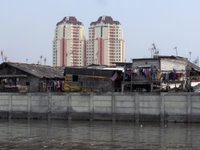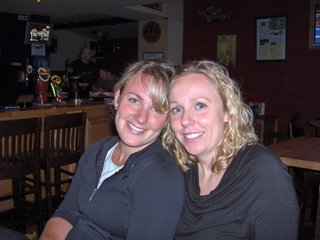Tuesday, 27 June 2006
Sunday, 25 June 2006
Jakarta: A City of Contrasts
 JK: In rather Forest Gump-like fashion, I was sent to Jakarta at the last minute to present a paper on European human security at a conference on South East Asian Security Cooperation. Although most of my time was spent in the conference room, I did have 1.5 days to explore the city. Unfortunately, there was no time to actually get out of the capital and explore the countryside.
JK: In rather Forest Gump-like fashion, I was sent to Jakarta at the last minute to present a paper on European human security at a conference on South East Asian Security Cooperation. Although most of my time was spent in the conference room, I did have 1.5 days to explore the city. Unfortunately, there was no time to actually get out of the capital and explore the countryside.Jakarta is Blade Runner-esque. Huge skyscrapers straddled by shanty towns. Ultra-modern indoor shopping malls enveloped by garbage strewn canals. I love cities, warts and all, but I have to say it was difficult to be charmed by Jakarta's wares. Still, there were wacky and neat things to see.
Some of the highlights included the old harbour, where only sailing schooners without engines are permitted to dock (pic below). The sea of TV antennas popping up along the sides of highway bridges was also interesting. I found out that the "super-stretched" antennas came from illegal shelters built underneath the bridges. For more photo evidence of this trip, click here.

Tuesday, 20 June 2006
Keeping the Flame of Hope Alive
"Throughout their long and daunting journey from oppression and persecution to asylum and protection, and eventually to a place they can call home, refugees show incredible strength, courage and determination. Their journey is a dangerous and arduous one and every day spent in exile is a day too long.
But in every step of their journey refugees carry with them an unshakable, unrelenting hope. By hanging on to their hopes for basic survival, sustenance and protection, and for the chance to one day rebuild their lives, refugees defy all odds. As the UN Refugee Agency (UNHCR), we continue to be impressed by the tenacious hopefulness of refugees which, in turn, motivates us to leave no stone unturned in the fulfillment of our mandate, to protect them and to find durable solutions to their plight.
On World Refugee Day, we ask you to remember the millions of refugees under our care who are trying to pick up the pieces of once-peaceful lives. As different as they are from each other, one thing connects them all: hope for a better future and a chance to restore lasting peace to their lives.
Help us keep that flame of hope alive!"
While the number of refugees worldwide has reached a quarter-century low, UNHCR's annual tally of uprooted people rose in 2005 to nearly 21 million, with the rise to the refugee agency's expanding role in caring for internally displaced people (IDPs).
UNHCR draws inspiration from the perseverance of the world's estimated 20.8 million people of concern to the agency – including some 8.4 million refugees – and the fact they never give up hope despite losing everything. While global refugee figures had dropped 31 percent since 2001, returnees often still faced a bleak future back home. Greater focus is needed on ensuring countries move forward after conflict. The international community needs to devote much more attention to the transition between relief and development and to rebuilding societies ripped apart by violence so that refugees who go home, can stay home.
As an expression of solidarity with Africa, which hosts the most refugees, and which traditionally has shown them great generosity, the UN General Assembly adopted Resolution 55/76 on 4 December 2000. In this resolution, the General Assembly noted that 2001 marked the 50th anniversary of the 1951 Convention relating to the Status of Refugees, and that the Organization of African Unity (OAU) had agreed to have International Refugee Day coincide with Africa Refugee Day on 20 June. The Assembly therefore decided that, from 2001, 20 June would be celebrated as World Refugee Day. [Note: The OAU was replaced by the African Union on 9 July 2002.]
For more information, please visit: the United Nations and United Nations High Commissioner for Refugees.
Sunday, 18 June 2006
Farewell to Erica!!
Saturday, 17 June 2006
Farewell to Petros!!

 MK: Friday evening on a boat that couldn't sail, a kaleidoscope of friends assembled to bid adieu to a Brussels legend. Yes, Petros is leaving the town he made famous in the eyes of young female Eurocrats. He has set his eyes on something larger than any of us could imagine. He accepted to work at the House of Lords in London on condition they provide him with a made-to-fit wig with white flowing curls! It is with much deep sorrow, we say goodbye to a great friend.
MK: Friday evening on a boat that couldn't sail, a kaleidoscope of friends assembled to bid adieu to a Brussels legend. Yes, Petros is leaving the town he made famous in the eyes of young female Eurocrats. He has set his eyes on something larger than any of us could imagine. He accepted to work at the House of Lords in London on condition they provide him with a made-to-fit wig with white flowing curls! It is with much deep sorrow, we say goodbye to a great friend.Now JK won't have anyone to watch football (aka soccer) matches with...You can only imagine the smile I have on my face as the thought crosses my mind!! JK: wrong dear wife, I have Stamatis and "Fabric".
Tuesday, 13 June 2006
World Cup of Football for Girls!
For those of you who feel the same way I do, there is a flickering light at the end of the sweaty, yellow card-laden, tunnel. Read on:
"For gals who get no kick from the game"
By Doreen Carvajal - International Herald Tribune SATURDAY, JUNE 3, 2006
Kirsten Jensen, 27, a secretary from Rotterdam, remains unconvinced. "I'm part of a group of women who think that there's just too much about soccer on television and that we have to do something against it," she said. Jensen and a group of five friends are behind two new Web sites in English and Dutch that promote the rebellious notion of soccer-free zones. On the sites, www.wegmethetwk.nl and www.stoptheworldcup.co.uk, they have published new rules of engagement. Rule No. 1, "Stop the World Cup," is something they do not expect to achieve, Jensen admitted, though she is more hopeful about Rule No. 5: "Each and every hour of televised football must be compensated with two hours of 'Sex and the City' or 'Desperate Housewives.'" Her boyfriend, she said, tolerates her protests but is not pleased with her demand for remote-control dominance.
Saturday, 10 June 2006
At the UN, how we envy the World Cup...
You could even say it's more universal. FIFA has 207 members; we have only 191.
But there are far better reasons to be envious. First, the World Cup is an event in which everybody knows where their team stands, and what it did to get there. They know who scored and how and in what minute of the game; they know who missed the open goal; they know who saved the penalty.
I wish we had more of that sort of competition in the family of nations. Countries openly vying for the best standing in the table of respect for human rights, and trying to outdo one another in child survival rates or enrolment in secondary education. States parading their performance for all the world to see. Governments being held accountable for what actions led them to that result.
Second, the World Cup is an event that everybody on the planet loves talking about, dissecting what their team did right, and what it could have done differently - not to mention the other side's team.
People sitting in cafés anywhere from Buenos Aires to Beijing debate the finer points of games endlessly, revealing an intimate knowledge not only of their own national teams but of many of the others too, expressing themselves on the subject with as much clarity as passion. Normally tongue-tied teenagers suddenly become eloquent, confident, and dazzlingly analytical experts.
I wish we had more of that sort of conversation in the world at large. Citizens consumed by the topic of how their country could do better on the Human Development Index, or in reducing the amount of carbon emissions or the number of new HIV infections.
Third, the World Cup is an event that takes place on a level playing field, where every country has a chance to participate on equal terms. Only two commodities matter in this game: talent and teamwork.
I wish we had more levelers like that in the global arena. Free and fair exchanges without the interference of subsidies, barriers or tariffs. Every country getting a real chance to field its strengths on the world stage.
Fourth, the World Cup is an event that illustrates the benefits of cross- pollination between peoples and countries. More and more national teams now welcome coaches from other countries, who bring new ways of thinking and playing.
The same goes for the increasing number of players who, between World Cups, represent clubs away from home. They inject new qualities into their new team, grow from the experience, and are able to contribute even more to their home side when they return.
In the process, they often become heroes in their adopted countries - helping to open hearts and broaden minds.
I wish it were equally plain for all to see that human migration in general can create triple gains - for migrants, for their countries of origin and for the societies that receive them. That migrants not only build better lives for themselves and their families, but are also agents of development - economic, social and cultural - in the countries they go and work in, and in the homelands they inspire through newly won ideas and know-how when they return.
For any country, playing in the World Cup is a matter of profound national pride. For countries qualifying for the first time, such as my native Ghana, it is a badge of honor. For those who are doing so after years of adversity, such as Angola, it provides a sense of national renewal. And for those who are currently riven by conflict, like Ivory Coast, but whose World Cup team is a unique and powerful symbol of national unity, it inspires nothing less than the hope of national rebirth.
Which brings me to what is perhaps most enviable of all for us at the United Nations: The World Cup is an event in which we actually see goals being reached.
I'm not talking only about the goals that a country scores; I also mean the most important goal of all - being there, being part of the family of nations and peoples, celebrating our common humanity.
I'll try to remember that when Ghana plays Italy in Hannover on June 12. Of course, I can't promise I'll succeed."
Friday, 9 June 2006
Place du Luxembourg
 The Eurocrats with World Cup 2006 fever!
The Eurocrats with World Cup 2006 fever!These pics are from Friday (9th June).


The World Cup Countdown is On!!




All photos are courtesy of "The official site for the 2006 FIFA World Cup Germany"






